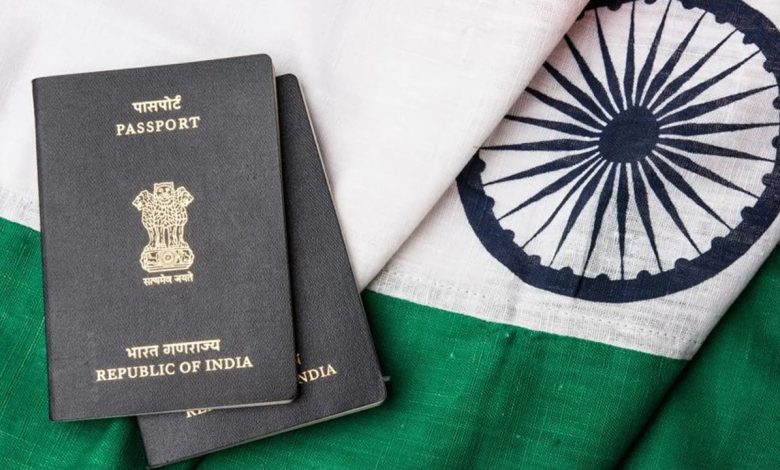Daily Current Affairs for UPSC
Renunciation of Indian Citizenship
Syllabus- Government Policies and Interventions [GS Paper 2]

Context- According to data presented in Parliament by the Ministry of External Affairs (MEA), over 2.25 lakh Indians renounced their citizenship in 2022, the highest number since 2011.
Key Highlights
- The data show how, with new passports, Indians, particularly High-net-worth individuals (HNIs), are moving west in search of better opportunities, healthcare, a better quality of life, and education, among other things.
- HNIs are those with a wealth of more than $8.2 crore, or more than $1 million. In December 2021, the Henley Global Citizens Report indicates that there were 3.47 lakh of these individuals in India.
- Only nine cities had 1.49 lakh HNIs among them: Delhi, Mumbai, Kolkata, Bengaluru, Hyderabad, Pune, Chennai, Gurgaon, and Ahmedabad are the other cities.
- India ranked fourth in the world in terms of privately held wealth, following the United States, China, and Japan, according to the report.
- According to representatives from the industry, there has been an increase in requests for residence-through-investment programs, particularly for the EB-5 visa from the United States, the Golden Visa from Portugal, the Global Talent Independent Visa from Australia, the Permanent Residency Program from Malta, and the Residence by Investment Program from Greece.
Why do individuals give up their citizenship?
- General:
-
-
- Some people are driven from their homes by climate change or unfavorable domestic political circumstances. Others leave for better jobs and living conditions.
- High-net-worth individuals around the world who renounce citizenship acquired at birth may do so for reasons of rising crime rates or the absence of business opportunities at home, according to a 2020 report from the Global Wealth Migration Review.
- They are frequently the first to leave, and unlike middle-class citizens, they have the means to leave. This can also be a sign of bad things to come.
- Women’s and children’s safety, lifestyle factors like climate change and pollution, financial concerns like taxes, better healthcare for families and educational opportunities for children, and escaping oppressive governments are among the other reasons.
-
- India:
-
- Some older Indians are opting to leave India to live with relatives in other countries because younger generations in the country hold passports from other nations. In some high-profile cases, individuals may be fleeing the law or fearing legal action for alleged crimes when they leave India.
- In contrast to the pre-Independence diaspora movement, which witnessed forced and contractual labor, the post-Independence diaspora community has been leaving India for jobs and higher education.
- Since India does not permit dual citizenship, individuals must give up their Indian citizenship in order to become citizens of another nation.
- Countries where Indians have migrated for a long time or where people have family or friends would be more obvious choices, as would factors like simpler paperwork and environments that are more welcoming to ethnic and social groups.
What is citizenship?
- Provisions of the Constitution:
-
-
- As stated in the Constitution’s Union List, citizenship falls solely within Parliament’s jurisdiction.
- Although the term “citizen” is not defined in the Constitution, Part 2 (Articles 5 to 11) provides information about the various categories of individuals who are eligible for citizenship.
-
- Acquisition of Indian Citizenship:
-
-
- Birth, descent, registration, naturalization, and incorporation of territory are the five methods of citizenship stipulated by the Citizenship Act of 1955.
-
- The 2019 Citizenship (Amendment) Act:
-
- Hindus, Sikhs, Buddhists, Jains, Parsis, and Christians from Afghanistan, Bangladesh, and Pakistan who entered India prior to 2015 were granted fast track citizenship by the Act.
- Prior to submitting an application for Indian citizenship, they must now reside in India for a minimum of five years.
How can you give up your Indian citizenship?
- Renunciation on One’s Own:
-
-
- Indian citizenship can be given up at any time by an Indian citizen who is of legal age and wishes to do so.
- Every minor child of an Indian citizen loses his or her Indian citizenship when an individual gives up his or her citizenship. However, he may regain Indian citizenship when he turns 18 years old.
-
- By Termination:
-
-
- Single citizenship is provided by India’s Constitution. This stipulates that an Indian can only hold citizenship in one nation at a time.
- Indian citizenship automatically terminates if a person acquires citizenship in another nation. However, India cannot use this provision while it is engaged in war.
-
- Deprivation by Government:
-
- An Indian citizen’s citizenship may be revoked by the Indian government in the following circumstances:
- Constitutional rights have been violated by the citizens.
- If the individual has fraudulently obtained citizenship.
- The citizen engaged in illegal trading or communication with the adversary during a conflict.
- Any country can sentence a citizen to 2 years in prison within 5 years of registration or naturalization.
- The citizen has been continuously residing outside of India for seven years.





.png)



